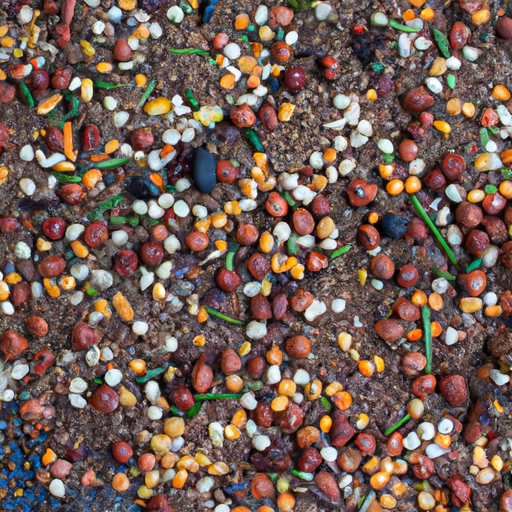If you’re a proud owner of backyard-raised chickens, you may be wondering if there are specific feed recommendations for these clucking companions. Well, you’re in luck! This article will shed light on the importance of providing the right nutrition for your feathered friends and discuss the specific feed considerations that can help keep them healthy and thriving. Keeping your chickens well-fed and happy has never been easier!
Determining the Nutritional Needs of Backyard Chickens
Raising backyard chickens can be a rewarding experience, but it’s important to ensure that your feathered friends are getting the right nutrients to stay healthy and thrive. Understanding their specific nutritional needs is crucial in providing them with a well-balanced diet. There are several factors to consider when determining the nutritional needs of your backyard chickens, including their age, purpose, breed, size, climate, and environmental factors.
Identifying the Age and Purpose of the Chickens
The age and purpose of your chickens play a significant role in determining their nutritional needs. Just like humans, chickens have different dietary requirements at different life stages. Chicks require starter feed, pullets and young hens need grower feed, and mature hens require layer feed. Starter feed should be fed to newly hatched chicks for the first 6 to 8 weeks of their lives to provide them with the essential nutrients they need for growth and development. Grower feed is then given to chickens from 8 weeks to 20 weeks of age, as their nutritional needs change during this period. Finally, layer feed is given to egg-laying hens to support the production of high-quality eggs.
Considering the Breed and Size of the Chickens
The breed and size of your chickens are also factors that influence their nutritional needs. Different chicken breeds have different metabolisms and growth rates, which means they may require different amounts and types of feed. For example, larger breeds like Plymouth Rocks and Brahmas may need more feed than smaller breeds like Silkies or Bantams. Additionally, if you have a mix of different size chickens in your flock, it’s important to provide a variety of feed options to accommodate their needs.
Assessing the Climate and Environmental Factors
The climate and environmental factors in your area can influence the nutritional needs of your backyard chickens. In hot climates, chickens may require additional electrolytes and water to stay hydrated. In cold climates, extra calories are often needed to help chickens maintain body heat and stay warm. Additionally, environmental factors such as access to pasture or forage can impact the nutritional content of their diet. It’s important to consider these factors and make adjustments to their feed accordingly.
Understanding the Basic Diet of Backyard Chickens
To ensure that your backyard chickens receive a well-rounded diet, it’s important to understand the basic components of their diet. A balanced diet for chickens consists of protein, carbohydrates, vitamins, minerals, water, and energy sources.
The Role of Protein in a Chicken’s Diet
Protein is the building block of muscles, feathers, and other tissues, making it an essential component of a chicken’s diet. It is especially important during periods of growth and egg production. Good sources of protein for chickens include insects, worms, soybean meal, fish meal, and mealworms. It’s important to provide a balanced source of protein to support their overall health and development.
The Importance of Carbohydrates and Energy Sources
Carbohydrates provide the necessary energy for chickens to perform their daily activities. Grains like corn, wheat, and barley are common sources of carbohydrates in chicken feed. It’s important to provide a mix of grains to ensure a variety of nutrients and to prevent boredom in your flock. Additionally, access to a free-choice source of energy, such as cracked grains or scratch grains, can help supplement their diet and provide extra energy.
Essential Vitamins and Minerals for Chickens
Vitamins and minerals are vital for the overall health and well-being of your backyard chickens. Vitamin A, D, E, and K are essential for proper growth, bone development, and immune function. Minerals like calcium, phosphorus, and magnesium are necessary for the formation of strong eggshells, muscle function, and overall health. Feeding a well-balanced commercial feed or providing appropriate supplements can help ensure that your chickens receive all the necessary vitamins and minerals they need.
Commercial Chicken Feed Options
Commercial chicken feed is a convenient and reliable option for providing your backyard chickens with a well-balanced diet. There are different types of commercial feed specifically formulated for each stage of a chicken’s life.
Starter Feed for Newly Hatched Chicks
Starter feed is a protein-rich feed designed specifically for newly hatched chicks. It provides the essential nutrients needed for growth and development during the critical first few weeks of their lives. Starter feed typically contains a higher protein content than other types of chicken feed to support proper growth and feather development.
Grower Feed for Developing Chickens
After the initial stage, chicks transition to grower feed. Grower feed is formulated to meet the nutritional needs of growing chickens between 8 and 20 weeks of age. It contains a balanced blend of protein, carbohydrates, vitamins, and minerals to support healthy growth and development.
Layer Feed for Egg-laying Hens
Once your chickens reach maturity and start laying eggs, it’s essential to switch them to layer feed. Layer feed is specifically formulated to support the nutrient requirements of egg-laying hens. It contains increased levels of calcium to support the production of strong eggshells and a proper balance of essential vitamins and minerals.
Supplementary Feed Options for Backyard Chickens
While commercial feed is a reliable option, there are also various supplementary feed options that you can provide to your backyard chickens. These options can enhance their diet and provide additional variety and enrichment.
Kitchen Scraps and Leftovers
Many kitchen scraps and leftovers can be safely fed to backyard chickens, reducing waste in your household. However, it’s important to avoid feeding them anything toxic, such as chocolate, coffee, onions, or avocado. Suitable kitchen scraps include vegetable peels, fruit scraps, cooked rice or pasta, and stale bread. It’s essential to ensure that the scraps are fresh and have not spoiled before giving them to your chickens.
Cracked Grains and Whole Grains
Cracked grains and whole grains are an excellent source of energy and can be used as a supplementary feed option. Cracked corn, barley, and wheat can be scattered on the ground or added to their feeders to create mental stimulation through foraging. These grains are also a great option during colder months, as the digestion process generates heat and helps the chickens stay warm.
Vegetables and Fruits as Treats
In addition to their regular diet, vegetables and fruits can be given to chickens as healthy treats. These treats provide essential vitamins and minerals while also providing enrichment for your flock. However, it’s important to remember that treats should only make up a small portion of their overall diet. Suitable options include leafy greens, carrots, peas, watermelon, and berries.
Balancing the Diet of Backyard Chickens
Maintaining a balanced diet for your backyard chickens is essential for their overall health and performance. There are several factors to consider when balancing their diet, including understanding the feed label and nutritional information, providing calcium-rich diets for strong eggshells, and monitoring their body condition.
Understanding the Feed Label and Nutritional Information
When choosing commercial feed for your chickens, it’s important to understand the feed label and nutritional information provided. The label will list the ingredients and the percentage of protein, fiber, fat, and other nutrients present in the feed. Checking the nutritional information can help ensure that you are providing the appropriate feed for your chickens’ age and purpose.
Calcium-Rich Diets for Strong Eggshells
Calcium is crucial for egg-laying hens to produce strong and healthy eggshells. Including calcium-rich foods like oyster shells or crushed eggshells in your chickens’ diet can help meet their calcium requirements. It’s important to provide these supplements free-choice so that the chickens can regulate their own calcium intake.
Monitoring the Chickens’ Body Condition
Regularly monitoring your chickens’ body condition can help you ensure they are receiving the appropriate amount of food. Underweight or overweight chickens may require adjustments to their diet. To check their body condition, feel their breastbone and pelvic bones. A chicken in optimal condition should have a slight padding over these bones.
Common Feed Mistakes to Avoid
While providing the right nutrition for your backyard chickens is crucial, it’s equally important to avoid common feed mistakes that can have negative impacts on their health and well-being.
Feeding Chickens a Diet High in Fats and Sugars
Chickens have different nutritional needs than humans and should not be fed diets high in fats and sugars. These types of foods can lead to obesity, oversupply of fat in eggs, and other health issues. It’s important to stick to a balanced and appropriate diet for chickens to ensure their overall health.
Over-reliance on Commercial Feed
While commercial feed is a reliable option, chickens also benefit from a diverse and varied diet. Over-reliance on commercial feed alone may lead to nutrient deficiencies or boredom in the flock. Providing a combination of commercial feed, kitchen scraps, cracked grains, and treats can help prevent these issues and provide a more enriched diet.
Neglecting Fresh Water and Grit
Water is an essential component of a chicken’s diet, and access to fresh and clean water should always be available. Chickens also rely on grit, which helps them break down and digest their food properly. Neglecting to provide grit can hinder their ability to properly digest their food, leading to poor nutrient absorption and potential health issues.
Special Considerations for Backyard Chickens
While the general recommendations discussed so far are suitable for most backyard chickens, there are some special considerations to keep in mind to meet the specific needs of your flock.
Alternative Feed Options for Vegetarian or Organic Diets
If you follow a vegetarian or organic lifestyle and want to extend these choices to your backyard chickens, there are alternative feed options available. Look for vegetarian or organic feeds that meet the nutritional requirements of your chickens. However, it’s important to consult with experts or do thorough research to ensure the chosen feed meets all the necessary nutritional needs.
Feeding Chickens During Winter Months
During colder months, extra care needs to be taken to keep the chickens warm and well-fed. A cold environment can cause chickens to burn more energy to stay warm. Providing additional calories in the form of cracked grains or kitchen scraps can help them maintain their body temperature. It’s also important to offer plenty of fresh, unfrozen water to prevent dehydration.
Preventing Nutritional Deficiencies in Free-range Chickens
If you allow your chickens to free-range and forage, they may have different nutritional needs compared to chickens in a confined environment. While foraging is a great way for your chickens to find insects, worms, and vegetation, it’s important to monitor their food sources and access to a balanced diet to prevent nutritional deficiencies. Providing a supplemental feed may be necessary to ensure they receive all the essential nutrients.
Managing Feed Storage and Waste
Proper management of feed storage and waste is essential for maintaining the quality and safety of your chickens’ food.
Proper Storage of Commercial Feeds
Commercial feeds should be stored in a cool, dry place to prevent spoilage and infestation. It’s important to keep the feed in air-tight containers to protect it from moisture, pests, and rodents. Additionally, it’s recommended to use the oldest feed first to prevent it from expiring.
Minimizing Feed Spoilage and Contamination
To minimize feed spoilage and contamination, it’s important to provide feeders that protect the feed from being soiled by dirt, droppings, or rain. Use feeders that allow chickens to access the feed easily while preventing excessive waste. Regularly cleaning the feeders and removing any spoiled or moldy feed is crucial in maintaining the health and well-being of your flock.
Creative Uses for Excess Chicken Feed
If you find yourself with excess chicken feed, there are creative ways to put it to good use. You can use the feed to attract wild birds to your backyard by creating a designated feeding area. Additionally, you can donate the excess feed to local animal shelters or farms where it can be put to good use.
Consulting with Experts and Farmers
While this article provides valuable information on determining the nutritional needs of your backyard chickens, it’s always beneficial to consult with experts and experienced farmers.
Seeking Advice from Local Agriculture Extension Offices
Local agriculture extension offices are valuable resources that can provide you with expert advice and guidance specific to your region. They can offer insights into local feed options, nutritional requirements, and best practices for raising backyard chickens.
Joining Online Forums and Community Groups
Joining online forums and community groups dedicated to backyard chickens allows you to connect with experienced chicken keepers. These platforms provide a space for asking questions, exchanging knowledge, and learning from the experiences of others in the community.
Learning from Experienced Backyard Chicken Keepers
Experienced backyard chicken keepers can offer valuable firsthand knowledge and advice. Reach out to friends, neighbors, or local farmers who have successfully raised chickens for guidance and tips. Their practical experience can provide you with valuable insights and help you make informed decisions regarding your flock’s nutrition.
Conclusion
Providing a well-balanced diet is essential for the health and well-being of your backyard chickens. Determining their nutritional needs based on their age, purpose, breed, size, climate, and environmental factors is crucial. Understanding the basic components of their diet, such as protein, carbohydrates, vitamins, minerals, water, and energy sources, is essential in meeting their specific requirements. Commercial feed options provide a convenient and reliable source of nutrition, but supplementary feed options like kitchen scraps, cracked grains, and treats can enhance their diet and provide enrichment. Balancing their diet involves understanding feed labels and nutritional information, providing calcium-rich diets for strong eggshells, and monitoring their body condition. Avoiding common feed mistakes and considering special considerations for your backyard chickens will ensure their optimal health. Proper management of feed storage and waste is vital in maintaining the quality and safety of their food. Consulting with experts, joining online forums, and learning from experienced backyard chicken keepers will provide you with invaluable guidance and support. With the right knowledge and care, your feathered friends will not only be healthy but also happy as they continue to grace your backyard with their presence.




